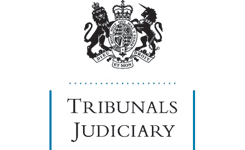|
Notes:
|
Recovery of overpayment - whether recoverable from appointee
The appellant was appointed by the Secretary of State to act on behalf of her daughter who was a claimant of income support. From May 1997 until she died in April 2000, the claimant lived in a nursing home. Whilst there she had received disability living allowance and incapacity benefit as well as income support, such benefits being paid by direct credit transfer into the claimant's bank account over which the appellant had power of attorney. On 7 April 1999 the relevant county council informed the incapacity benefit section of the Department that a health authority had taken over responsibility for the claimant's nursing home fees from 8 October 1998. On 12 April 1999 the adjudication officer reviewed the award of income support and revised it with effect from 6 October 1998 on the basis that the claimant had ceased to be entitled to income support, once her nursing home fees were fully funded by the health authority, because her incapacity benefit exceeded her applicable amount. In June 2000 two separate overpayment decisions were made with respect to the appointee. The first related to the period from 6 October 1998 to 5 April 1999, by virtue of which recovery was sought under section 71(1) of the Social Security Administration Act 1992 on the basis that on 8 October 1998 or as soon as possible thereafter the appointee on behalf of the claimant failed to disclose the material fact that the health authority were funding the claimant's stay in the nursing home. The second related to the period from 6 April 1999 to 12 April 1999 and sought recovery under regulation 11 of the Social Security (Payments on Account, Overpayments and Recovery) Regulations 1988 on the basis that overpayment in that week had been caused by direct credit transfer arrangements. The appointee appealed, arguing that the overpayment was not recoverable because she could not reasonably have been expected to tell the Department about the change of funding and, relying on CIS/332/1993, that, in any event, a failure to disclose or a misrepresentation by an appointee grounded recovery against the claimant alone and not against the appointee unless the latter was acting in a personal capacity rather than in the capacity as appointee. The tribunal dismissed her appeal, preferring R(IS) 5/00 to CIS/332/1993. The claimant appealed to the Commissioner. The Chief Commissioner directed that the appeal be determined by a Tribunal of Commissioners
Held, allowing the appeal in part, that:
1. the tribunal's decision was erroneous in point of law because, applying R(SB) 21/82, unless disclosure by the appellant was reasonably to be expected, there was no failure to disclose on her part and the tribunal had not considered whether the appellant could reasonably have been expected to know that the new source of funding was, or might be, a material fact that she ought to disclose (paragraph 39);
2. on the evidence, the appellant could not have been expected to realise until 1 December 1998 that the change of the source of funding was, or might be, a material fact that she ought to disclose and, accordingly, the overpayment before then was not recoverable from her (paragraph 45);
3. where an appointee had obtained a social security benefit by misrepresenting or failing to disclose a material fact, the Secretary of State might generally recover the overpaid benefit from both the appointee and the claimant, but, where the appointee had retained the benefit instead of paying it to, or applying it for the benefit of, the claimant, only the appointee was liable and, where the appointee had acted with due care and diligence, only the claimant was liable (paragraph 63);
4. from the finding that disclosure by the appellant of the change of source of the funding was reasonably to be expected, it followed that she had not used due care and diligence and, accordingly, the resulting overpayment from 1 December 1998 to 5 April 1999 was recoverable from her under section 71(1) and (3) of the 1992 Act (paragraph 69);
5. an overpayment might be recovered from an appointee under regulation 11 of the 1988 Regulations only to the extent that the appointee had not paid the money to the claimant or applied it for the claimant's benefit and, otherwise, was recoverable only from the claimant who had had the benefit of the money so that, in this case, the overpayment from 6 April 1999 to 12 April 1999 was not recoverable from the appellant because the benefit had been paid straight to her daughter (paragraphs 73 and 74);
6. in every case where there is an appointee, the Secretary of State should, when the overpayment is discovered, issue a recoverability decision that deals with the liability of both the appointee and the claimant (paragraph 67) |
